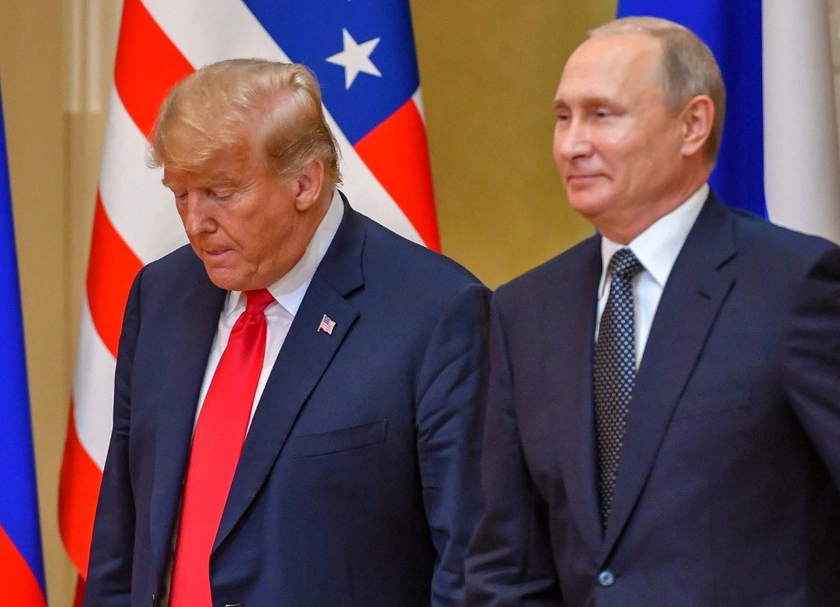With Syrian President Bashar al-Assad ousted on Sunday, many believed that Russia’s military presence that helped Assad maintain its iron grip on the country would have no option but to soon depart.
However, a source in the Kremlin told Russian state media TASS on Sunday that it received guarantees from Syrian rebel groups that Russian interests, including its military bases, would be protected.
JOIN US ON TELEGRAM
Follow our coverage of the war on the @Kyivpost_official.
“Russian officials are in touch with representatives of the armed Syrian opposition, whose leaders have guaranteed the security of Russian military bases and diplomatic missions on Syrian territory,” the source told TASS.
Moscow has also involved Turkey, a major backer of the Syrian rebel groups, in the discussions, Kremlin spokesman Dmitry Peskov told reporters on Monday.
“We are in dialogue with Ankara and other regional states, including on Syrian affairs,” Peskov said before acknowledging that it was too early to speak about the future of Russian bases in Syria, according to Reuters.
Russia has supported Assad’s regime in Syria since 2015 when it launched a military intervention to bolster Syrian government forces - providing airstrikes, weapons and military advisors to combat Syrian opposition factions.
Russian bases in Syria
Russia has two main military bases in Syria – the Khmeimim Air Base in Lakatia and the Tartus Naval Base, both located on the Mediterranean coast, with other smaller bases and outposts scattered across the country.
Trump Sees ‘Good’ Chance for Peace; Kyiv Denies Trump Claim of Ukrainian Troop Encirclement
The Khmeimim Air Base served as Russia’s primary air base in Syria from which it launched its aerial support to the Assad regime, while the Tartus naval base – Russia’s only naval base on the Mediterranean Sea – serves as a staging port for its naval operations.
Moscow was effectively gifted the Khmeimim Air Base in 2015 by the Assad regime, where it could be used free of charge without a time limit, while the Tartus Naval Base was leased to Russia for 49 years in 2017.
However, Moscow established a permanent military presence in both bases in 2017 following a deal with the Assad regime, with full Russian jurisdiction over both bases.
Losing Tartus could hamper Moscow’s naval operations against Ukraine, according to an analysis by The Telegraph.
At the time of writing, the rebel groups gained full control of the regions hosting both bases.
Will the rebels take the Russian bases?
Judging by photos of some Syrian rebels burning Russian flags during the latest offensive, to say that they dislike Moscow, which aided the Assad regime’s violent crackdowns, would be an understatement.
That said, there are no signs that the rebels are moving in against the Russian bases yet.
Reuters, citing a Russian milblogger, reported on Monday that Russian warships had already departed the Tartus coast for security reasons, and the Khmeimim Air Base had been cut off after rebels took control of the nearby town.
The milbogger also said Kurdish forces in the north began to block Russian facilities beyond the Euphrates, and Russian positions at an oil facility in rebel-controlled Homs had been blocked. Reuters said it could not verify the milblogger’s assertions.
As of Tuesday it appears that Moscow’s approach is to evacuate valuable assets in case it loses control over the bases.
Peskov said on Monday that Moscow’s military has been “taking all necessary precautions.” Military news outlet Militarnyi, citing satellite images, claimed that Moscow has been evacuating some of its high-end missile defenses from the Khmeimim Air Base and several warships from the Tartus port in recent days.
Ukraine’s Defense Intelligence (HUR) also claimed on Tuesday that Moscow has “deployed a caravan of military transport ships” to carry troops and equipment out of Syria.
Is a deal on the horizon?
While Russia has legal control over the bases in Syria, it is unclear if the rebels will honor the agreements signed by the Assad regime.
That said, the rebels, with the group spearheading the offensive still designated as a terrorist group by the West, might be prompted to strike a deal with Moscow, however unlikely.
Theoretically, Moscow can exchange its assets in Syria to retain control over its military bases, considering its sizable investments in the country throughout the last decade.
A 2019 report by Arab News said Russian companies have invested in Syria’s oil, gas and mining sectors and won contracts to build flour mills and water-pumping stations.
Kremlin spokesperson Peskov also said Moscow engaged Ankara about Russian bases in Syria, though an analyst asserted that Turkey has influence but not control over the rebels.
Andreas Krieg, a security specialist at King’s College London, told AFP that Turkey, a key supporter of the rebels, is the big regional winner from Assad’s fall, but it does not control the rebels.
Krieg added that Russia is likely to lose the bases.
“I can’t see how the new regime or the new socio-political order will allow the Russians to remain after everything the Russians have done to prop up the Assad regime,” he said.
You can also highlight the text and press Ctrl + Enter











